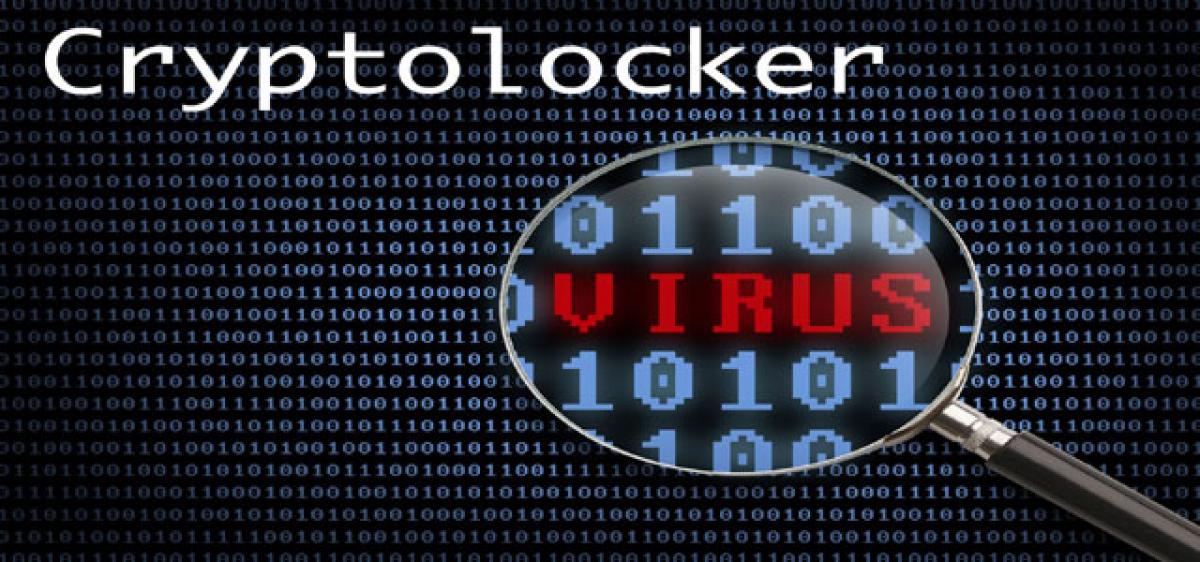Live
- Why PM mum on Caste Census, removing 50 pc quota limit: Rahul Gandhi
- Barrackpore Municipality Vice-Chairman found dead at home, suicide note suggests blackmail
- Selection trials announced for 20th Asian Senior Women's Handball Championship
- Women’s Asian Champions Trophy: India register 3-0 win over Olympic medallist China in Rajgir
- Sr Men's National Hockey: Odisha overcomes Haryana to secure maiden title
- Even Trinamool leaders not safe in Bengal: BJP
- K’taka: Police complaint lodged against petitioner in MUDA case
- Andhra college student jumps to death from hostel building after petty spat
- Bengal: ED investigating bank accounts of Bangladeshi citizens arrested in Hawala scam
- National Racing C'ship: Tijil Rao dominates in Formula LGB4 title race
Just In
Cyber security experts suggest measures to curb data loss


With efforts to decode or decipher Ransomware virus and trace its origins yet to result in locating and identifying the source, experts are now suggesting ways to prevent loss of data since a cure seems to be elusive.
Ransomware Epidemic
With efforts to decode or decipher Ransomware virus and trace its origins yet to result in locating and identifying the source, experts are now suggesting ways to prevent loss of data since a cure seems to be elusive. The ransomware virus is so named because the ransom sought by the hackers from victims of the viral attack for unlocking the data from the infected computers.
The primary objective of WannaCry which is a ransomware virus is to encrypt all of the data on targeted systems, rendering the data inaccessible until the owner pays a ransom to the hackers. The ransom is generally paid with an untraceable digital “crypto-currency” like Bitcoin. Once payment is received, the hackers give their victim a code that will unlock their hijacked data.
According to Virginia Tech Cybersecurity expert, Eric Jardine, the cyber attacks are an an important reminder for internet users to practice regular digital hygiene in efforts to prevent future ransomware attacks. He pointed out that new survey results from the Centre for International Governance Innovation indicate that in prior ransomware attacks, 91 percent of those who paid actually regained access to their data.
That is the slim silver lining to ransomware in general. The WannaCry attack is different, however, and is not configured in such a way as to allow the attacks to really know who is paying them for the keys. Users need to beware. "At the end of the day, anyone can be affected by ransomware. The old motto, an ounce of prevention is worth a pound of cure, is hugely relevant here.
Users, be they individuals on their laptops or multibillion dollar firms, need to think in terms of resiliency. Eventually, we will all get hacked. What matters is how we handle it when the worst case scenario happens. Users need to back up files and employ some basic digital hygiene so that they can minimize risk and bounce back from the inevitable."
According to Michael Silva, Adjunct Professor, Computer Science, NYIT School of Engineering & Computing Sciences, the little-published secret to defeating Ransomware is as simple as keeping regular backups. Ransomware encrypts your data, but if you have a backup, you can simply erase the encrypted data and replace it with your good backup copy.
Backups won't prevent you from getting infected, but it will save you from the ugly specter of potentially paying a ransom for something stolen from you. “Remember that your backups are only as good as your ability to restore that data, so periodically recover a file and make sure it is what you expect.
Paid tools like DropBox detect mass file changes and identify these as potentially catastrophic events, enabling you to go back to a known, pre-infection, copy. Alternatively, you can simply copy files periodically to a USB drive and physically remove it once the backup is complete. Make sure that your backup system is physically disconnected from your main system otherwise, the virus could potentially encrypt your backups as well,” he says and further warns that hackers are becoming increasingly more sophisticated with their attempts to extract information and get you to download and execute their malicious software.
Pointing out that in the past, mass emails were sent in the hopes that an unsuspecting recipient would click a link and download malicious software, Michael Silva says that some hacking rings are now operating like organized gangs, building organizational charts and verifying staff employment for their targets through direct phone call campaigns.
Their hope is that by building incredibly convincing emails, neither your spam filters, nor you or your peers may notice that the email sent from "your boss" isn't actually from him or her at all, even though it may match their signature, writing style and font perfectly.

© 2024 Hyderabad Media House Limited/The Hans India. All rights reserved. Powered by hocalwire.com






